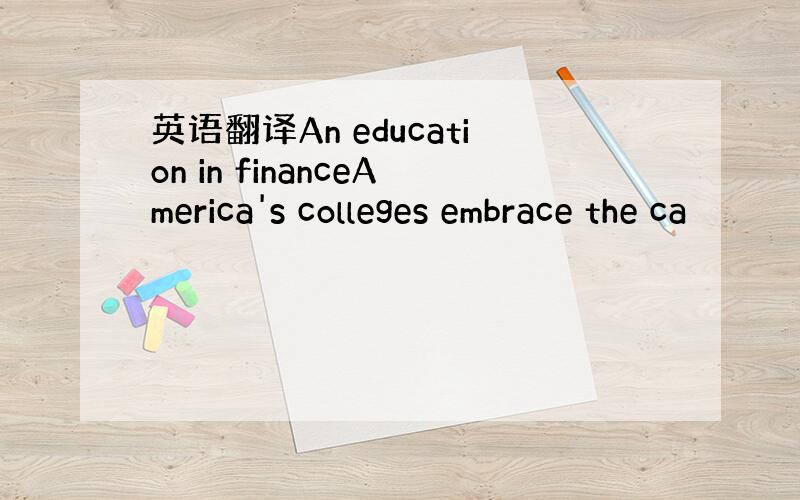英语翻译An education in financeAmerica's colleges embrace the ca
来源:学生作业帮 编辑:灵鹊做题网作业帮 分类:英语作业 时间:2024/04/20 01:07:12
英语翻译
An education in finance
America's colleges embrace the capital
markets
IN
THE lecture halls of America's universities,capitalism is far more likely to
be damned than praised.Those who run the universities,however,have a keen
appreciation of the capital markets.It is well known that some institutions,
notably Harvard,have benefited greatly from putting top-notch managers in
charge of their endowment funds.Less well known is the increasing willingness
of colleges to borrow in the markets,too.On May 15th,for example,Cornell
University sold $250m-worth of bonds.In recent weeks both Harvard and the
University of Texas have also raised hundreds of millions of dollars in this
way.
Such
debt-raising is becoming more common,although the average bond issue is smaller
than these.Lehman Brothers reckons that the overall market for highereducation
debt has tripled since 2000,to $33 billion,and there are abundant reasons
besides the recent trend to believe that the market will grow much bigger yet.
Largely
this is because colleges are only belatedly becoming aware of how useful the
financial markets can be.No doubt some of their hesitation has been cultural:academics
may have been reluctant to look at their universities as businesses; or they
may have misunderstood what was needed to help those businesses grow.
If they did
look at their institutions in economic terms,people in education tended not to
think that universities lacked capital.Rather,they thought that they had a structural
inability to use capital and labour more efficiently.Unlike the car industry,
say,which is continually cutting the number of worker-hours needed to assemble
a vehicle,many schools felt that they must maintain,or even increase,the
ratio of employees (teachers) to customers (students).Small class sizes are taken
as a signal of high quality,so investing money to save on teachers' salaries is
not an attractive strategy.
Schools had
other reservations as well.Poor schools were worried about being unable to
service debt.Rich schools with huge endowments ($25 billion at Harvard,$12
billion at the University of Texas,$4 billion at Cornell) may have seen no
need.And college administrators may not have considered that their
institutions' primary assets—reputation,inspiration and insights—were suitable
as collateral.
So much for an
academic perspective.A growing number of investors saw things differently.
Those lovely buildings on rolling campuses,the better universities'
reputations,taxpayers' backing of state-owned institutions:all this looked to
them like a deep pool of assets against which lots of money could be borrowed.
The money raised could be used to attract more customers,who are choosy about
the product and whose demand varies little with the price (loudly though they
may complain).
An education in finance
America's colleges embrace the capital
markets
IN
THE lecture halls of America's universities,capitalism is far more likely to
be damned than praised.Those who run the universities,however,have a keen
appreciation of the capital markets.It is well known that some institutions,
notably Harvard,have benefited greatly from putting top-notch managers in
charge of their endowment funds.Less well known is the increasing willingness
of colleges to borrow in the markets,too.On May 15th,for example,Cornell
University sold $250m-worth of bonds.In recent weeks both Harvard and the
University of Texas have also raised hundreds of millions of dollars in this
way.
Such
debt-raising is becoming more common,although the average bond issue is smaller
than these.Lehman Brothers reckons that the overall market for highereducation
debt has tripled since 2000,to $33 billion,and there are abundant reasons
besides the recent trend to believe that the market will grow much bigger yet.
Largely
this is because colleges are only belatedly becoming aware of how useful the
financial markets can be.No doubt some of their hesitation has been cultural:academics
may have been reluctant to look at their universities as businesses; or they
may have misunderstood what was needed to help those businesses grow.
If they did
look at their institutions in economic terms,people in education tended not to
think that universities lacked capital.Rather,they thought that they had a structural
inability to use capital and labour more efficiently.Unlike the car industry,
say,which is continually cutting the number of worker-hours needed to assemble
a vehicle,many schools felt that they must maintain,or even increase,the
ratio of employees (teachers) to customers (students).Small class sizes are taken
as a signal of high quality,so investing money to save on teachers' salaries is
not an attractive strategy.
Schools had
other reservations as well.Poor schools were worried about being unable to
service debt.Rich schools with huge endowments ($25 billion at Harvard,$12
billion at the University of Texas,$4 billion at Cornell) may have seen no
need.And college administrators may not have considered that their
institutions' primary assets—reputation,inspiration and insights—were suitable
as collateral.
So much for an
academic perspective.A growing number of investors saw things differently.
Those lovely buildings on rolling campuses,the better universities'
reputations,taxpayers' backing of state-owned institutions:all this looked to
them like a deep pool of assets against which lots of money could be borrowed.
The money raised could be used to attract more customers,who are choosy about
the product and whose demand varies little with the price (loudly though they
may complain).

金融教育
美国的大学接受资本市场
如果你身处美国大学的演讲大厅,你会发现,资本主义常常受到贬低.然而,那些大学的管理者们却对资本市场感恩戴德.众所周知,一些机构的高层管理者从基金捐赠的举办中获得极大利益,哈佛就是其中的典型代表.鲜为人知的是,越来越多的大学开始热衷于向市场贷款.例如,康奈尔大学在5月15日,出售了价值2亿5千万美元的债券.近几周来,哈佛大学和德克萨斯大学也以同样的方式筹集了数亿美元.
尽管债券的平均发行量供不应求,类似这样以贷款来集资越来越普遍.如今,整个市场高等教育的贷款已经达到330亿美元,较之2000年时,已经增长了两倍,得鉴于此,雷曼兄弟猜想,除了最近的大势所趋之外,有足够多的理由相信,这类市场将获得更大的发展.
很大程度上,是由于大学才刚刚意识到金融市场巨大的利用价值.毫无疑问,由于传统文化的根深蒂固,一部分人还对此迟疑不决:学术界可能会对大学的商业化嗤之以鼻;或者他们根本误解了扩大商业化所需的条件,其实并非他们想象的那么污秽不堪.
如果他们从经济学角度,认真审视了自己所属的机构的话,教育工作者绝难想象大学会缺乏资金.他们反而会认为学校未能更有效地利用资本和劳动力.在汽车行业中,通常会通过不断缩短平均每辆车的生产时间、提高效率,以此增加收益;但很多学校与之不同,校方认为,基于学生的利益考虑,他们至少应该维持现有教师的数量,必要时甚至会提高教师与学生的比率,以此提高教学质量.班级规模小意味着质量高,因此注资以节省教师薪水的方案几乎无人问津.
学校也在其他方面有所限制.普通学校担心自己无法偿债.与之相较,名牌大学由于有巨额的资金捐赠(哈佛大学250亿美元,德克萨斯大学120亿美元,康奈尔大学40亿美元),这方面却没有太多的担忧.大学的管理者们从不把学校的灵魂——声誉、灵感和洞察力——列入抵押品的考虑范畴中.
以上就是学术派的观点.越来越多的投资者对此事产生了不同的见解.为了获得漂亮的教学楼,更佳的学校声望,国有机构的纳税者支持,他们不断地借贷,然而却不过是杯水车薪.筹集的资金用来提升学校的品质,以此来吸引更多的学生,他们往往对细节吹毛求疵、却对高昂的学费视而不见.
美国的大学接受资本市场
如果你身处美国大学的演讲大厅,你会发现,资本主义常常受到贬低.然而,那些大学的管理者们却对资本市场感恩戴德.众所周知,一些机构的高层管理者从基金捐赠的举办中获得极大利益,哈佛就是其中的典型代表.鲜为人知的是,越来越多的大学开始热衷于向市场贷款.例如,康奈尔大学在5月15日,出售了价值2亿5千万美元的债券.近几周来,哈佛大学和德克萨斯大学也以同样的方式筹集了数亿美元.
尽管债券的平均发行量供不应求,类似这样以贷款来集资越来越普遍.如今,整个市场高等教育的贷款已经达到330亿美元,较之2000年时,已经增长了两倍,得鉴于此,雷曼兄弟猜想,除了最近的大势所趋之外,有足够多的理由相信,这类市场将获得更大的发展.
很大程度上,是由于大学才刚刚意识到金融市场巨大的利用价值.毫无疑问,由于传统文化的根深蒂固,一部分人还对此迟疑不决:学术界可能会对大学的商业化嗤之以鼻;或者他们根本误解了扩大商业化所需的条件,其实并非他们想象的那么污秽不堪.
如果他们从经济学角度,认真审视了自己所属的机构的话,教育工作者绝难想象大学会缺乏资金.他们反而会认为学校未能更有效地利用资本和劳动力.在汽车行业中,通常会通过不断缩短平均每辆车的生产时间、提高效率,以此增加收益;但很多学校与之不同,校方认为,基于学生的利益考虑,他们至少应该维持现有教师的数量,必要时甚至会提高教师与学生的比率,以此提高教学质量.班级规模小意味着质量高,因此注资以节省教师薪水的方案几乎无人问津.
学校也在其他方面有所限制.普通学校担心自己无法偿债.与之相较,名牌大学由于有巨额的资金捐赠(哈佛大学250亿美元,德克萨斯大学120亿美元,康奈尔大学40亿美元),这方面却没有太多的担忧.大学的管理者们从不把学校的灵魂——声誉、灵感和洞察力——列入抵押品的考虑范畴中.
以上就是学术派的观点.越来越多的投资者对此事产生了不同的见解.为了获得漂亮的教学楼,更佳的学校声望,国有机构的纳税者支持,他们不断地借贷,然而却不过是杯水车薪.筹集的资金用来提升学校的品质,以此来吸引更多的学生,他们往往对细节吹毛求疵、却对高昂的学费视而不见.
英语翻译An education in financeAmerica's colleges embrace the ca
英语翻译3.Every year in the U.S.,colleges and graduate schools c
英语翻译“Community colleges are an undervalued asset in our coun
patent's education plays an important part in the process of
英语翻译In traditional education,the teacher may feel that the s
英语翻译Marxism is one of the 39 schools,departments,colleges an
英语翻译Once upon a dream I was lost in love's embrace There I f
英语翻译University education plays an important role in a person
英语翻译store.Since education plays an indispensable role in man
In the contemporary world,education plays an increasingly ke
英语翻译In the United States 84 colleges now accept just women.
Online education forces colleges to focus on the rest of the